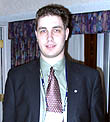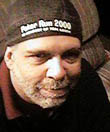|
|
This topic comprises 7 pages: 1 2 3 4 5 6 7
|
|
Author
|
Topic: I got a jury summons today! Ugh....
|
|
|
|
|
|
|
|
|
|
|
|
|
|
|
Leo Enticknap
Film God

Posts: 7474
From: Loma Linda, CA
Registered: Jul 2000
|
 posted 03-01-2006 03:40 AM
posted 03-01-2006 03:40 AM





I've been called twice and served once. The first time I was called I was ineligible to serve, for the simple reason that I knew the defendant (he was the boyfriend of a colleague who was on trial for breaching the Health and Safety Act in his restaurant). As soon as I told the judge this during the selection process, he dismissed me straightaway.
The second time I did sit on an eight day trial, of someone who was accused of benefit (social security) fraud. The trial lasted eight days and we convicted her. She ran a B & B, and was accused of continuing to claim benefits even after the individuals involved had moved on. I can't say any more than that because, under English law, it is strictly illegal for a juror to discuss or even mention the facts of what went on in a jury room during the deliberations, or their personal opinion as to the guilt or innocence of the defendant, even after the trial is over.
I know that isn't the case in at least some US states, as evidenced by several televised juror interviews after the Jackson trial along the lines of 'I thought he was guilty, but not beyond a reasonable doubt'. The judge in the trial I sat on explained that the reason is that public comments made by a juror after a trial could potentially prejudice a subsequent retrial (or, in the case of an acquittal, a civil action arising out of the same case) if one is ordered. If we later voiced any opinion on the issue in public, she explained, we could be done for contempt of court.
I had two 'jobs' at the time (I was a postgrad student plus projectionist), and thankfully both employers had policies of allowing their staff paid time (or in the case of the university, deferral of studies with no penalty) for jury service. But I can understand that jury service can be seriously problematic for people who aren't in that position.
quote: Allison Parsons
I'm sure that there are plenty of unemployed people in the Peoria IL area who are in desperate need for a job that would love to do it.
There's been quite a debate about that here, after a research study found that high-earning professionals were more likely to be excused from jury service by claiming that they'd suffer hardship as a result. So doctors, business people etc. are repeatedly getting out of it, while the unemployed and retired form the bulk of jurors. There have been allegations that this has resulted in incorrect verdicts, especially in cases involving complex or specialised evidence (e.g. big fraud trials), but AFAIK this is more speculation than a balanced conclusion. If this demographic make-up of jurors is true then I think we do need to see a more balanced cross-section of society sitting on them, but that of course depends on employers eating the cost of that (which, in the case of highly qualified and/or paid workers, can be considerable).
| IP: Logged
|
|
|
|
Mark Lensenmayer
Phenomenal Film Handler

Posts: 1605
From: Upper Arlington, OH
Registered: Sep 1999
|
 posted 03-01-2006 07:45 AM
posted 03-01-2006 07:45 AM




Called 3 times --- Served on 3 juries - All not guilty.
In my area, you are called for 2 weeks. You sit around until all the cases for the day are underway, then you can go home.
Common Pleas court is not fun...you just sit in a room all day waiting and waiting. There is TV, but usually on a boring station. So, you get lots of reading done.
Municipal Court is another matter. We have one of the best jury commisioners in the country who goes out of his way to make sure the 2 weeks is interesting and educational. He arranges judge visits and courtroom trips. Usually in the morning, there are 3-4 courtrooms available for viewing cases that will not come before a jury during our term You get to see all of the legal system from a very upclose point of view, and the judges are VERY gracious to the jurors, allowing them to ask questions between trials or even visit chambers. Judges are very aware that jurors are voters. Real court is nothing like TV, and you get to see exactly how things work. I would go again to Municipal court any time.
Its amazing how a group of people can come together to make a joint decision, then separate and never see one another again.
Oh, pay is $12.00 per day, which barely pays for parking and lunch.
| IP: Logged
|
|
|
|
|
|
|
|
Jason Burroughs
Jedi Master Film Handler

Posts: 654
From: Allen, TX
Registered: Jun 99
|
 posted 03-01-2006 11:17 AM
posted 03-01-2006 11:17 AM




Dallas County pulls its Juror list from drivers license registration. So theoretically anyone with a driver's license is subject to being called for jury duty, though a randomized list. However I have been called 3 times in the past 5 years, and I know people that have never been called.
Fortunately Dallas has a 1 trial, 1 day policy. If you are selected as a juror for a trial, you do not have to serve jury duty again for at least 6 months. Just indicate that you've served on a jury on the summons that is sent to you.
Alternately, if you are summonsed, and appear for jury duty, and are not selected, and are dismissed at the end of the day, you are not eligable for jury duty for at least 6 months.
In the US Jurors are free to talk about the trials that they sat on, as the trial is a matter of public record. There may be a few exceptions where the trial, and or outcome is sealed, and jurors on those trials may possibly be instructed not to discuss the trial after its completed. Of course the jurors cannot talk about the trial at all while it is ongoing.
| IP: Logged
|
|
Leo Enticknap
Film God

Posts: 7474
From: Loma Linda, CA
Registered: Jul 2000
|
 posted 03-01-2006 03:52 PM
posted 03-01-2006 03:52 PM





quote: Jason Burroughs
In the US Jurors are free to talk about the trials that they sat on, as the trial is a matter of public record.
UK trials are public in that anyone can attend in the public gallery, but video and audio recording is not permitted in any courtroom (so no actual TV coverage of the proceedings; all you see on the news is a reporter describing them from outside the court building). The judge explained the reasoning behind the 'no comment' law to us with the following examples.
Scenario 1 - defendant is convicted and lodges an appeal; between the two hearings a juror goes on the record as having changed his mind and now thinks the defendant is innocent; appeal results in a retrial being ordered; retrial jurors may have heard the original juror on TV, and so may be prejudiced.
Scenario 2 - defendant is acquitted but is then sued for damages by alleged victim, because the standard of proof needed in a civil case is lower (on a balance of probabilities) than in a criminal case (beyond a reasonable doubt). Between the two cases, a juror goes on the record as saying 'I think he's guilty, but was not sure beyond a reasonable doubt', thereby potentially prejudicing the jury in the later civil case.
quote: Gordon McLeod
in fact once the judge warned all of the panel at selection that anyone claiming a booked vacation would get a contempt of court sumouns...
Good. Travel insurance policies should cover that sort of thing, and if a juror is so stupid as to not take one out, that's his or her problem (it probably also suggests that (s)he is too thick to be on a jury in the first place, but that's another issue).
| IP: Logged
|
|
|
|
All times are Central (GMT -6:00)
|
This topic comprises 7 pages: 1 2 3 4 5 6 7
|
Powered by Infopop Corporation
UBB.classicTM
6.3.1.2
The Film-Tech Forums are designed for various members related to the cinema industry to express their opinions, viewpoints and testimonials on various products, services and events based upon speculation, personal knowledge and factual information through use, therefore all views represented here allow no liability upon the publishers of this web site and the owners of said views assume no liability for any ill will resulting from these postings. The posts made here are for educational as well as entertainment purposes and as such anyone viewing this portion of the website must accept these views as statements of the author of that opinion
and agrees to release the authors from any and all liability.
|

 Home
Home
 Products
Products
 Store
Store
 Forum
Forum
 Warehouse
Warehouse
 Contact Us
Contact Us




 Printer-friendly view of this topic
Printer-friendly view of this topic







![[evil]](graemlins/evil.gif) . I had to acknowledge it and mail it back in to them which I did. I wrote on it that they'd have to contact my employer in order to get ahold of me as I am out of town in Montana generally 50% of any month and I can't guarantee that I will get my mail in a timely fashion to know about it. So far we've not heard from them.....
. I had to acknowledge it and mail it back in to them which I did. I wrote on it that they'd have to contact my employer in order to get ahold of me as I am out of town in Montana generally 50% of any month and I can't guarantee that I will get my mail in a timely fashion to know about it. So far we've not heard from them.....

![[Big Grin]](biggrin.gif) so maybe that will detract them.
so maybe that will detract them.










